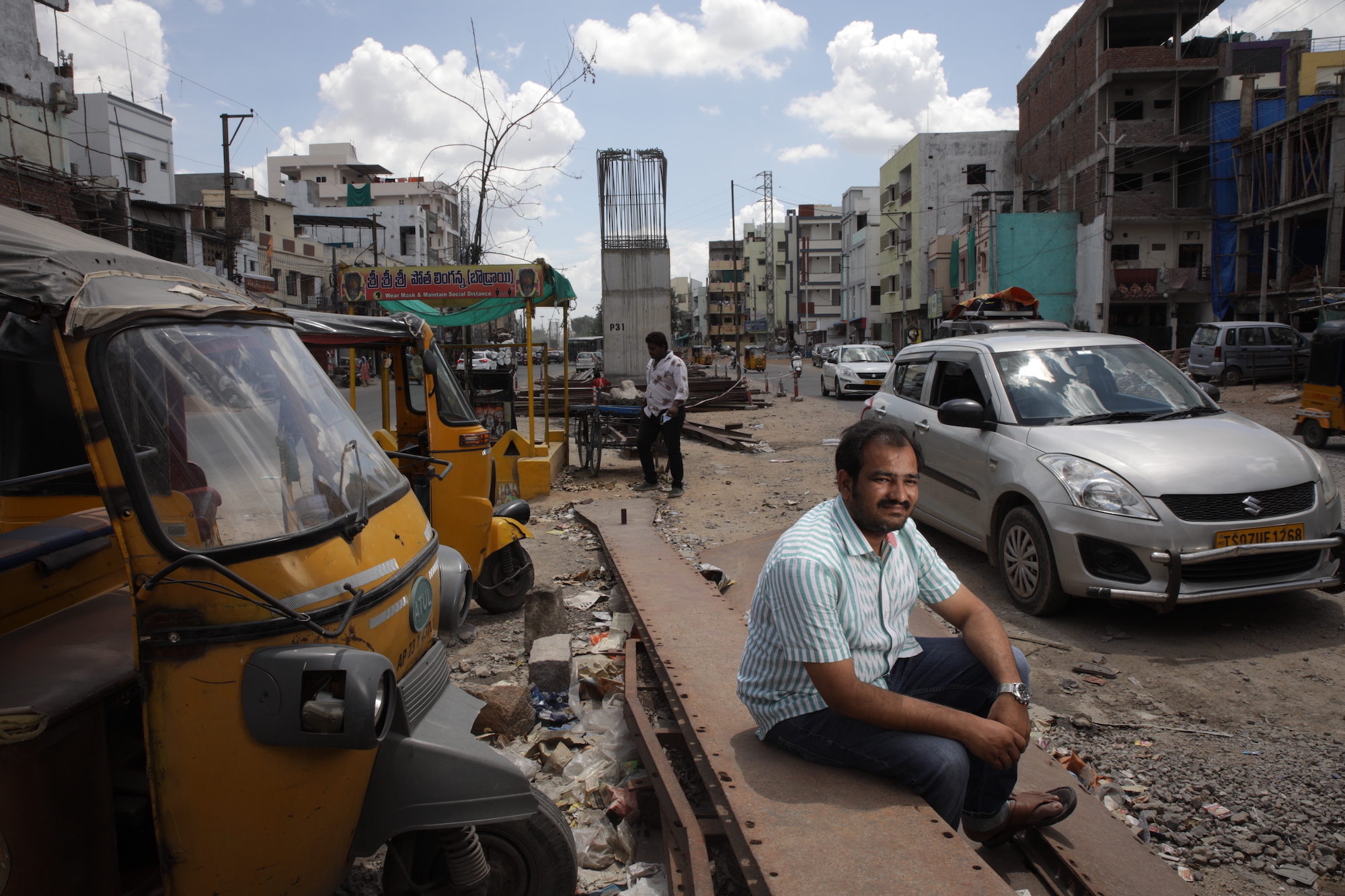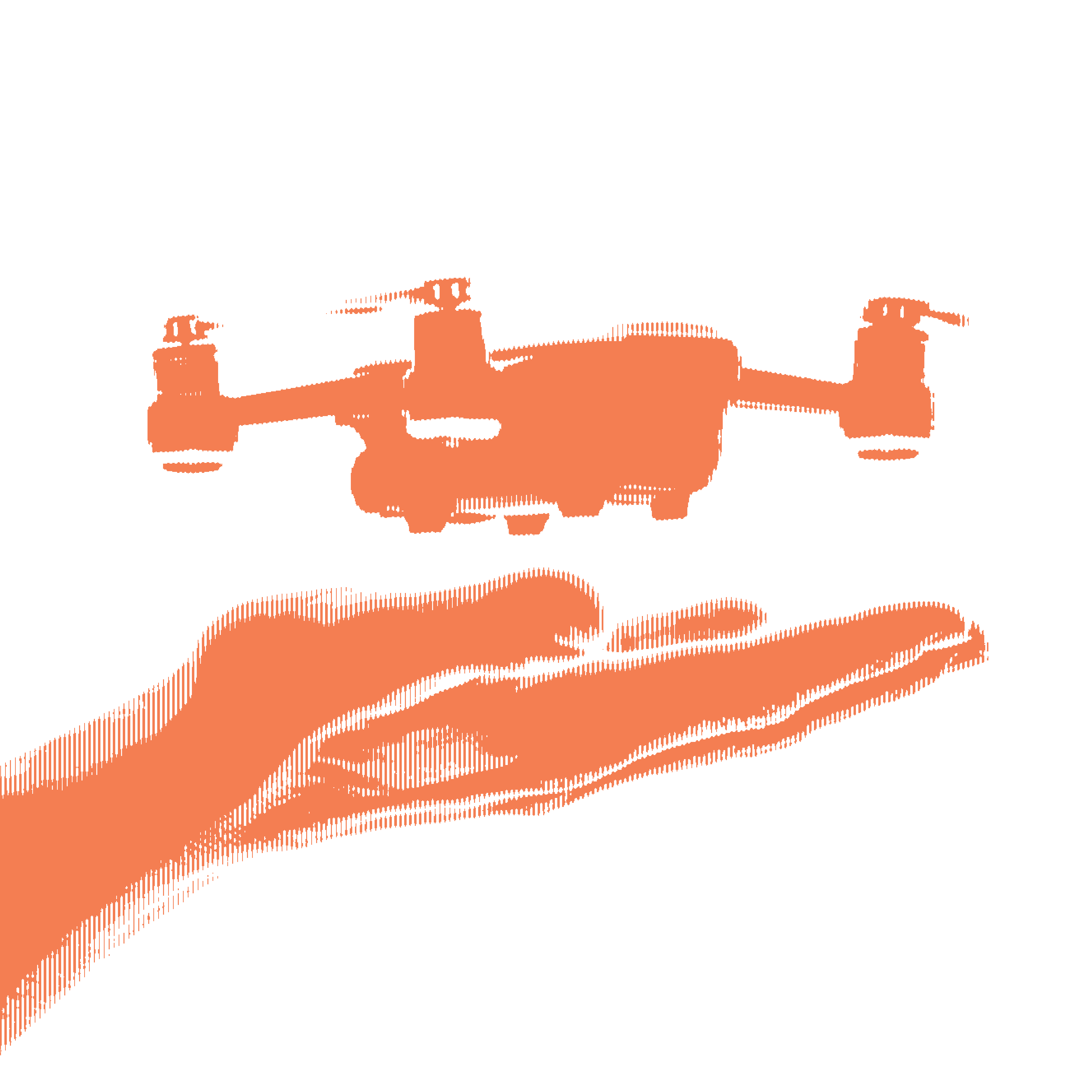Shaik Salauddin: the Indian driver-turned-union leader who is brushing shoulders with top politicians and giving ride-hailing firms a run for their money.
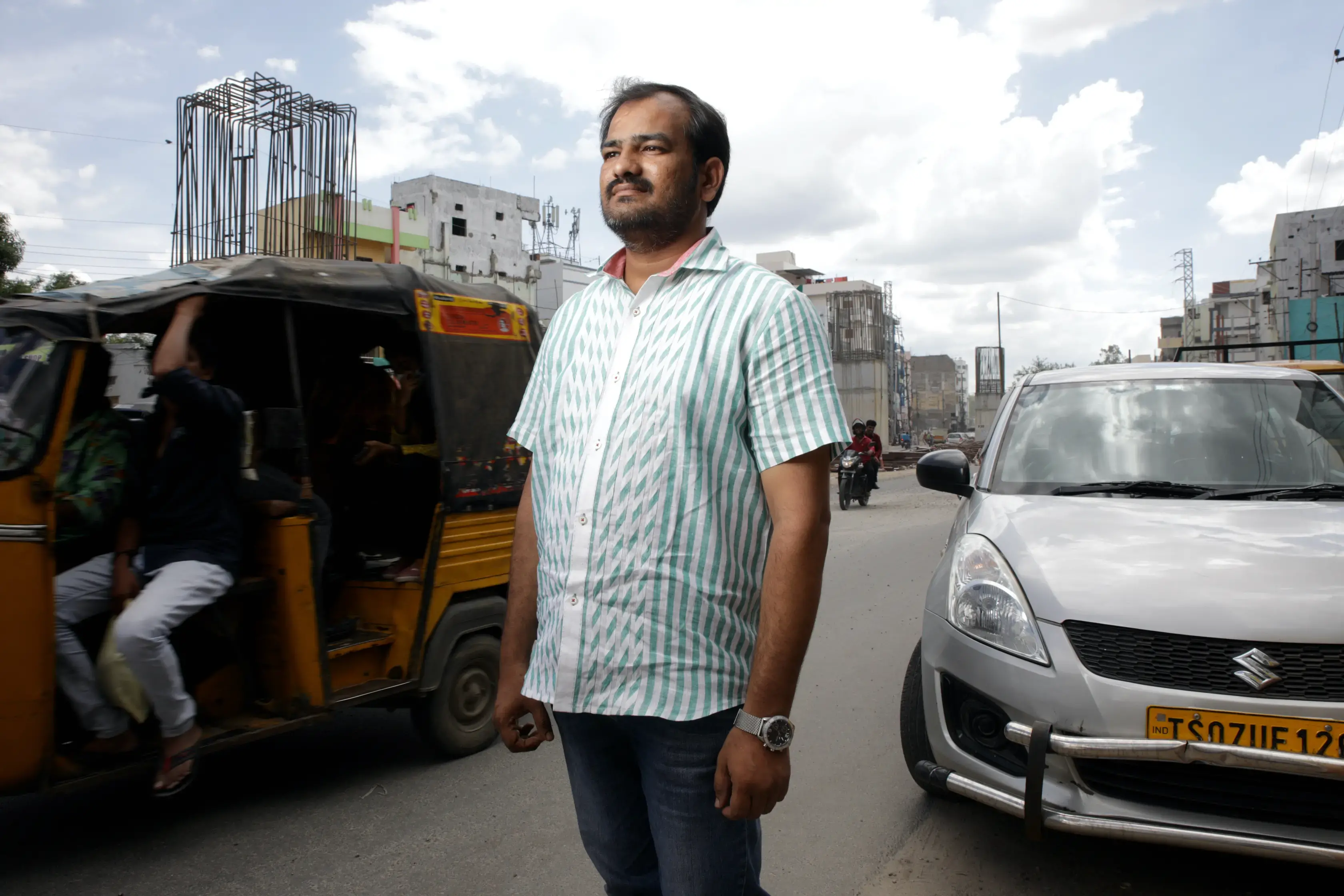
For nearly 20 minutes in November 2022, Shaik Salauddin walked alongside Rahul Gandhi, the former president of India’s main opposition political party, the Indian National Congress, in Hyderabad. The march was part of Gandhi’s Bharat Jodo Yatra (“unite India movement”), in which he walked across 12 states to modernize his party’s image, ahead of the elections in 2024. In a video, Gandhi can be seen placing his hand on Salauddin’s shoulder as they engage in a deep conversation while passing through the Kukatpally neighborhood of the southern Indian city.

As a nonprofit journalism organization, we depend on your support to fund more than 170 reporting projects every year on critical global and local issues. Donate any amount today to become a Pulitzer Center Champion and receive exclusive benefits!
Salauddin is neither a powerful politician nor an affluent business tycoon. An Uber driver by profession, over the last three years, Salauddin has become a quasi-celebrity as a gig industry organizer: spearheading strikes, engaging with policymakers, and highlighting issues in the media to help improve the working conditions of his peers. Walking alongside Salauddin sent a strong message to Gandhi’s supporters: He is serious about India’s unemployment issues. Perhaps Gandhi knew how important it was to be seen with the unofficial leader of millions of gig workers in India.
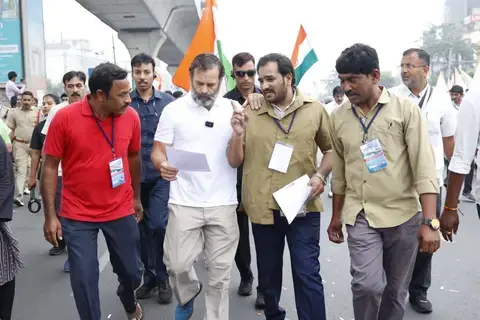
In 2019, Salauddin co-founded the Indian Federation of App-based Transport Workers (IFAT), a coalition of unions that now has over 36,000 members. He currently serves as the federation’s national general secretary. In 2020, he also launched the Telangana Gig and Platform Workers Union (TGPWU), which now has over 10,000 members, including cab drivers, food and grocery delivery workers, and e-commerce delivery persons from the southern state.
“We aren’t getting successes promptly, but have recently started to see some positive changes,” Salauddin told Rest of World. “My fight for gig and platform workers will keep going on.”
Four tech and gig-work researchers, and several journalists, told Rest of World that Salauddin is the de facto point person for any gig work-related issues. One researcher compared him to the “anchoring contact you have on LinkedIn who knows everybody.”
“In terms of ride-hailing, Shaik is the biggest union representative in the country,” Balaji Parthasarathy, lead investigator for India at Fairwork, who works closely with Salauddin, told Rest of World. Fairwork is a University of Oxford project that evaluates the working conditions of gig workers of digital platforms.
Salauddin was among the first wave of drivers to start working for Uber and Ola in Hyderabad. He told Rest of World that he decided to join Uber in 2014, lured by the company’s prominent advertising campaign and outreach to attract drivers. Prior to this, he used to drive rental taxis. “I spent the first three-four months just understanding what these platforms are,” Salauddin told Rest of World during a meeting at his Hyderabad office in June 2022.
The first few months of working for Uber were smooth, he said, with the company continuing to offer hefty incentives. Many of his fellow drivers bought cars on loan, banking on high payouts from Uber and other ride-hailing platforms like Ola, he said. But the smooth ride was short-lived. As more drivers joined, earnings started to decline.
This drop in earnings led to at least two Uber drivers dying by suicide in Hyderabad, allegedly after failing to pay the equated monthly installments on the cars they had bought for their work. Salauddin remembers watching an ambulance take the dead body of Mohammed Zaheer, one of the Uber drivers who died by suicide in January 2018, to the Uber office in Hyderabad. He spearheaded a protest with hundreds of other drivers in the city at the time, but realized it didn’t have the impact he had anticipated.
The deaths made Salauddin reconsider his path as just a driver, he said. He came to believe that companies such as Uber and Ola were exploiting him and his co-workers by setting unrealistic targets, without considering the repercussions. He realized then that gig workers across the country were fighting for their rights in isolation, and they needed to come together to make a difference. So, he started working towards unionizing.
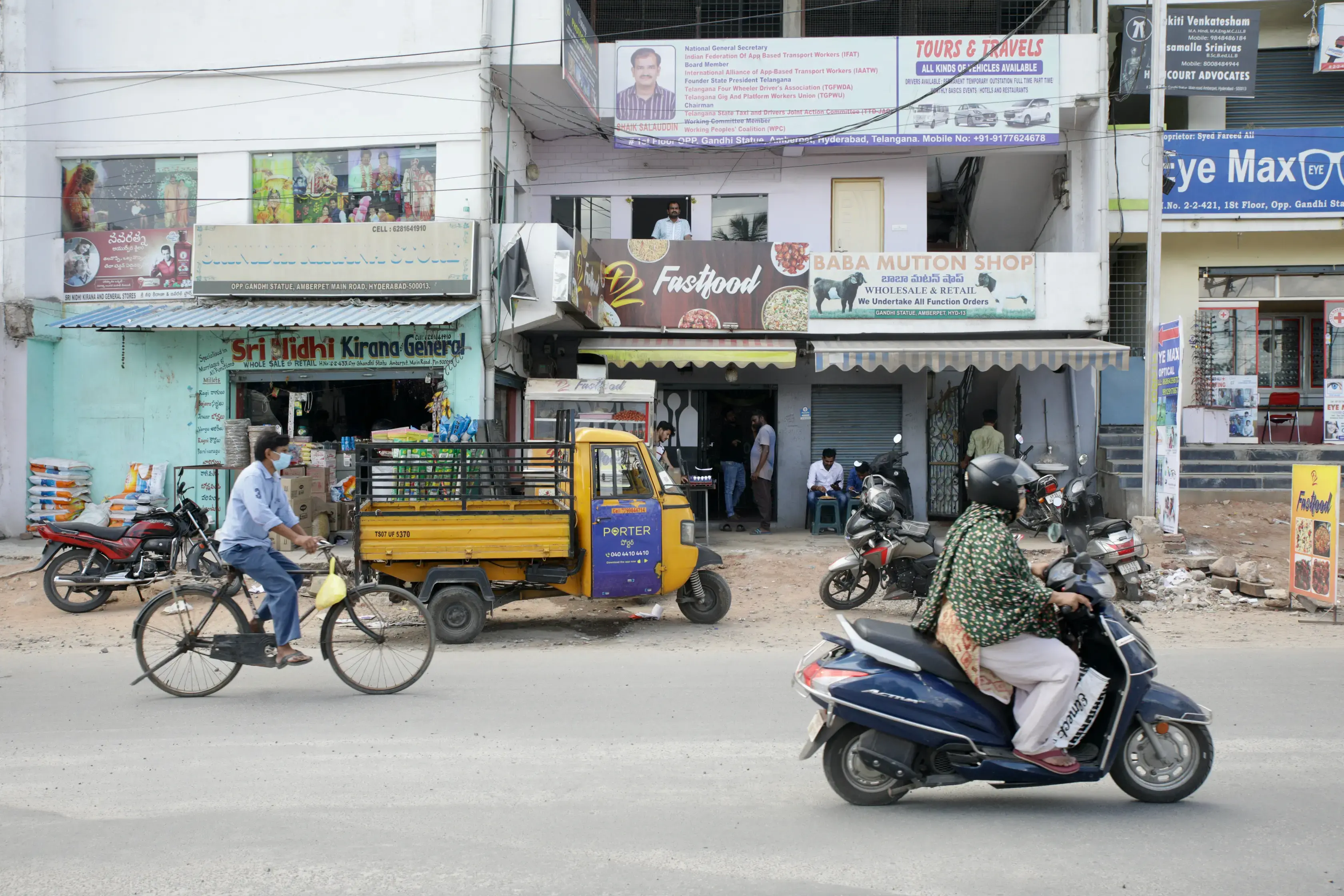
In response to queries sent by Rest of World about Uber’s interactions with driver union representatives in India, including Salauddin, a company spokesperson said, “Uber has always met with driver-partners to listen to their feedback about their experience with Uber and ensure we take that into account when making product changes and formulating policies.” The spokesperson further said that last year, Uber established a Driver Advisory Council to “bring together driver partners and Uber representatives to formally discuss issues or concerns.”
Now, Salauddin doesn’t drive for Uber as often as he used to. Instead, he spends his time coordinating with gig workers across states and organizing countrywide movements for gig worker rights and better working conditions.
In June, Rest of World visited Salauddin’s brand-new office in Hyderabad. Dressed as always in a button-down shirt and trousers, he sat cross-legged on the floor of the threadbare 400-square-foot office for much of the afternoon. Surrounded by a few plastic chairs and simple tables, Salauddin juggled phone calls, sending messages on Telegram and WhatsApp groups, and meeting local gig workers who came in seeking guidance.
His diary is his lifeline. In it, he scribbles notes during these meetings and keeps a daily timetable. He travels between Delhi, Bengaluru, Mumbai, and Kolkata, where he meets union members, and attends workshops and seminars. Because his car goes mostly unused during the week, he lends it out to other drivers. His last Uber ride was in September 2022, he said.
Salauddin, who has a degree in computer studies, switches between Hindi and English smoothly. He speaks confidently about the “unfair practices of platforms,” and frequently refers to “the algorithm” when talking about why gig workers suffer due to apps. Unlike many other union leaders in India, Salauddin is extremely tech- and media-savvy. He regularly keeps in touch with local and foreign journalists, sharing screenshots and press releases via WhatsApp. He’s articulate and knows how to build a story.
On the afternoon of Rest of World’s visit, Salauddin’s phone buzzed nonstop, mostly from Telegram and WhatsApp notifications. He’s in at least 64 Telegram groups and over 20 WhatsApp groups—many of which he has created—dedicated to providing a safe space for gig workers to discuss their woes in real time. “Just like policemen have walkie-talkies, we have these Telegram groups,” Salauddin said. “Whatever problems we want to discuss, we do it there. We start a movement from there.”
“Just like policemen have walkie-talkies, we have these Telegram groups.”
The conversations in these WhatsApp and Telegram groups—often through voice notes—eventually become the evidence that Salauddin uses to create press releases, lodge police complaints, and start campaigns against unfair practices by tech companies.
It was in one of these WhatsApp groups that Salauddin learned about the October 2022 incident, where a customer ordering on the delivery app Swiggy explicitly requested a Hindu delivery person, rather than, ostensibly, a Muslim delivery person. Salauddin highlighted the issue on Twitter—where he has over 1,500 followers—and triggered a nationwide debate.
“[We] demand that Swiggy take strict action against such bigotry,” he said in his tweet. “You built your business on the backs of workers and it’s your minimum duty to ensure their safety and dignity at work.”
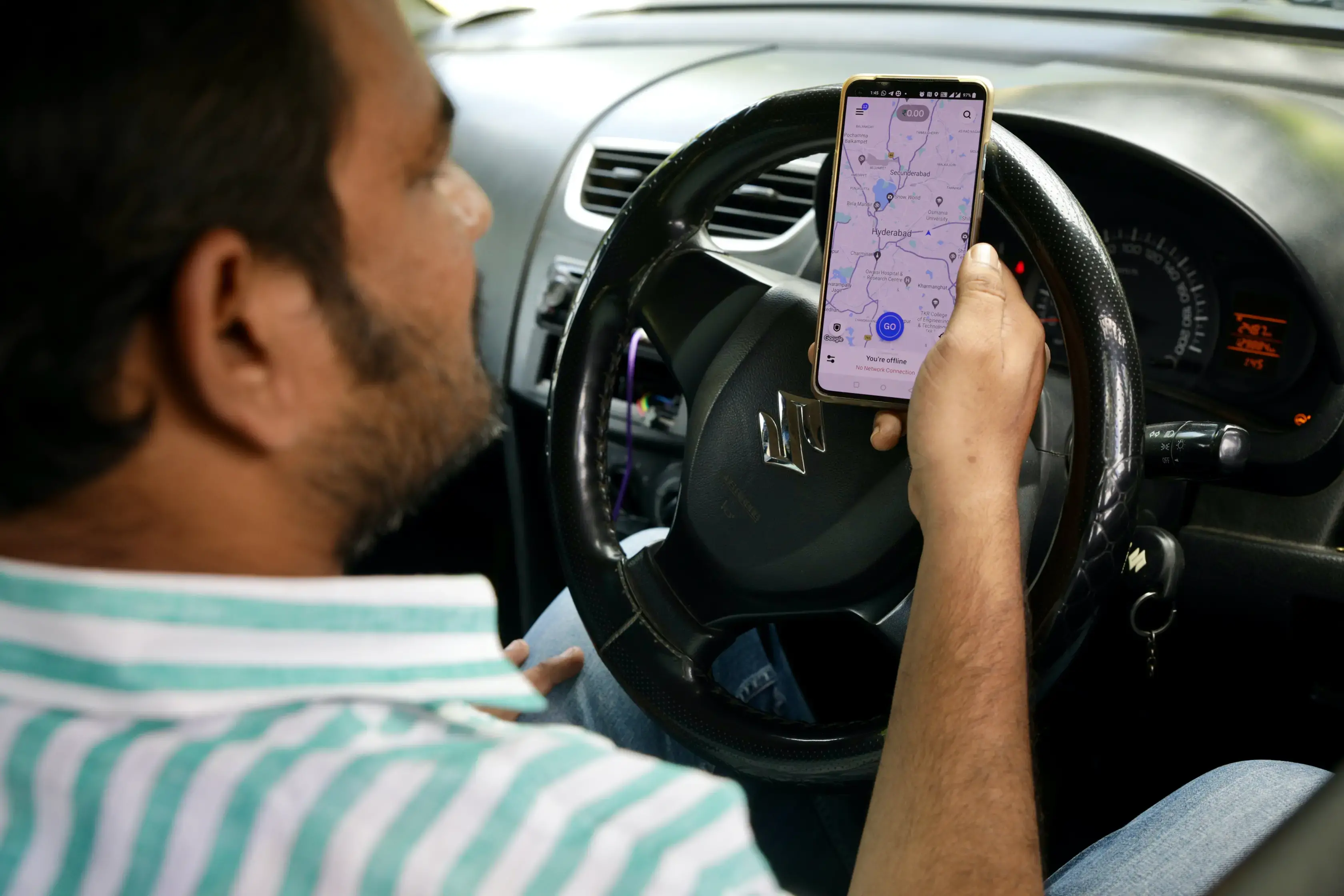
Salauddin insists that his union, TGPWU, isn’t politically affiliated. But over the course of his work, he has managed to rub shoulders with some prominent politicians like Asaduddin Owaisi, Kavitha Kalvakuntla, M. Shanmugam, Harbhajan Singh, and K. Keshav Rao, among others, he said.
In 2019, during a strike of public and private transport workers in Telangana, the state’s governor, Tamilisai Soundararajan, invited the Telangana State Taxi and Drivers Joint Action Committee to her office. She spoke to Salauddin, the committee’s chairman, and asked him to call off the strike.
Salauddin insists that his union, TGPWU, isn’t politically affiliated. But over the course of his work, he has managed to rub shoulders with some prominent politicians like Asaduddin Owaisi, Kavitha Kalvakuntla, M. Shanmugam, Harbhajan Singh, and K. Keshav Rao, among others, he said.
In 2019, during a strike of public and private transport workers in Telangana, the state’s governor, Tamilisai Soundararajan, invited the Telangana State Taxi and Drivers Joint Action Committee to her office. She spoke to Salauddin, the committee’s chairman, and asked him to call off the strike.
In 2020, Salauddin was also able to get the support of some local and state-level politicians to lobby the government to pass a bill on security benefits for gig workers. “I did a lot of internal lobbying to bring the social security code, and many of the politicians I met gave me a letter in support of that,” he said.
The efforts of IFAT and TGPWU have had other successes, too. In the spring of last year, cab drivers on Uber and Ola in India protested against low fares by switching off the air conditioning in their cars. Uber and Ola did not increase drivers’ base fares, but a month later, they agreed to display the drop location to drivers after years of resistance. Much of the mobilization and information-sharing that brought about these changes has been made possible through the Telegram and WhatsApp groups Salauddin is active in.
However, he says his biggest recent win has been getting Gandhi to talk about gig workers. “I thought he would give me five minutes just like he gave others,” Salauddin told Rest of World over the phone in November 2022. “I was a bit worried if this would just be a photo op or [would] actually make a difference — but he engaged with me, asked me a lot of follow-up questions.”
Salauddin claims that for years, Gandhi had never publicly discussed platforms like Swiggy, Zomato, Uber, and Ola, and the conditions of their workers. But, after their walk together, Gandhi has brought up the problems. Publicizing these issues, Salauddin says, drives him. “There’s nothing I can be happier about.”


